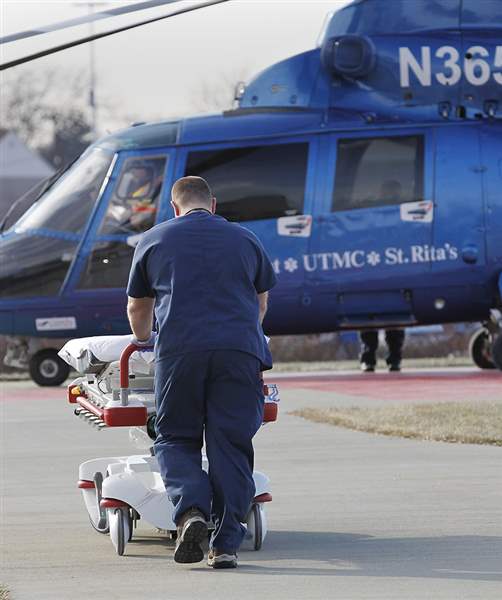
Mercy ends its partnership for Life Flight with UTMC
Trauma center accreditation may be at risk
3/21/2014
A paramedic wheels a bed to a Life Flight helicopter to transport a vehicular accident victim to the University of Toledo Medical Center.
THE BLADE
Buy This Image

A paramedic wheels a bed to a Life Flight helicopter to transport a vehicular accident victim to the University of Toledo Medical Center.
Mercy Health System is ending a 20-year partnership with the University of Toledo Medical Center to share Life Flight helicopters that transport trauma patients to hospitals from accident scenes, a move that could endanger UTMC’s status as a Level One trauma center.
Mercy, which owns and operates the Critical Care Transport Network helicopters, has informed UTMC, the former Medical College of Ohio, that it will not renew the partnership agreement that expires at the end of this month, said Dr. Ron McGinnis, interim dean of UT’s College of Medicine.
“Currently Mercy has agreed to extend it for three months, so we continue in talks with them and are looking at other options regarding transport,” Dr. McGinnis said.
When asked if Mercy would consider extending the contract again at the end of the three months, a Mercy spokesman would only say that: “At this time, the contract extension expires on July 1, 2014.”
Under terms of the current agreement, UTMC pays Mercy about $1.3 million a year to help cover the cost of the network that operates five medical helicopters and five mobile ambulances that largely transport critically ill patients to Mercy St. Vincent Medical Center, UTMC, or St. Rita’s Medical Center in Lima, Dr. McGinnis said.
Operating medical helicopter systems is very expensive for hospital systems and UTMC’s payments to Mercy have steadily increased over the last six years while the number of flights have declined, David Morlock, UT’s vice president of finance, said at a recent board of trustees meeting.
“Helicopter services generally lose money. If our payment is not covering the loss, they won’t have to split the transport. By keeping everything in their institution they can recoup some of the money lost. Cost is the biggest driver. It’s not us that’s weighing the cost benefit, Mercy is weighing the cost benefit,” Dr. McGinnis said.
Citing competitive reasons, Mercy officials declined to provide information about the number of trauma flights that the service provides each year or to say whether the system has seen a decrease in the use of the service in recent years.
“The decision to let the contract expire naturally was a business decision based on many considerations including finances and how we want to operate as a system of care moving forward in the best interest of our ministry. Patient care is always our top priority. As such, Life Flight will continue to transport patients based on request and any special medical needs,” Mercy officials said in a written statement.
“It goes back to Mercy changing its operating model,” Mercy spokesman Sarah Bednarski said. “It is not a reflection on UTMC in any way. We will continue to work with them and support them. It didn’t fit into our plans for the future.”
Mercy held a community meeting last month to announce the hospital system would be implementing several cost-cutting measures this year in the face of declining revenue and lower hospital admission rates.
Earlier this week, the Mercy system announced it was eliminating the job of its President and CEO Andrea Price in an effort to consolidate staff and implement a new leadership structure.
ProMedica, the other major health system in Toledo, operates its own medical helicopter system, ProMedica Air & Mobile.
Dr. McGinnis declined to say whether UTMC has approached ProMedica about the service.
UTMC officials are concerned that the loss of medical helicopter transports could lead to the hospital’s emergency department losing its designation as a Level One trauma center.
The minimum cutoff for this designation is 1,200 trauma cases per year. In 2013, UTMC treated 1,306 trauma patients, giving it a margin of 106 patients above the cutoff, UTMC spokesman Meghan Cunningham said.
She also noted that Life Flight transported 107 trauma patients to UTMC in that same year.
“The helicopter brings a minority of the trauma cases. It is a small piece but it is a necessary piece,” Dr. McGinnis said.
Dr. McGinnis said UTMC recently received a three-year Level One trauma center accreditation from the American College of Surgeons.
But if the hospital drops below the minimum required number of trauma patients, he said he would be obligated to report that to the accreditation organization.
Contact Marlene Harris-Taylor Marlene Harris-Taylor at: mtaylor@theblade.com or 419-724-6091.